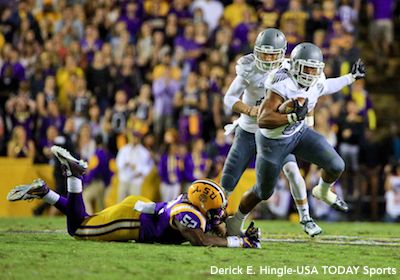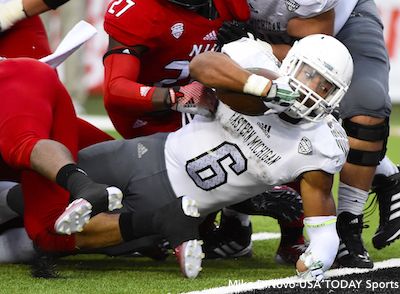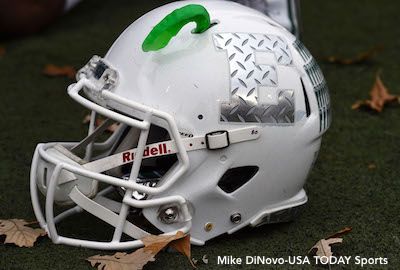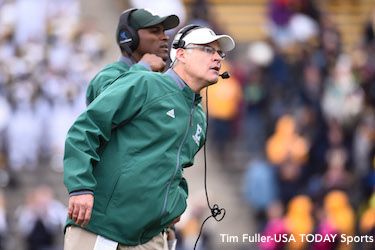Last week, HBO's "Real Sports with Bryant Gumbel" investigated the arms race in college sports. It focused on three schools, including Eastern Michigan University. Gumbel asked why EMU still spends so much money to compete in Division I football?
I've been asking the same question for a decade.
Eastern Michigan started competing in the Mid-American Conference in 1973, and has since won 134 conference titles in 20 sports. The Eagles excel in track, cross-country, and swimming -- men's and women's -- among other sports. They've had some great baseball and basketball teams, too.

But the football team is ... well, bad. Very bad. The Eagles have taken home exactly one MAC title in 43 years -- and that was back in 1987. In 1995, the Eagles went 6-5, which is only notable because that was their last winning season. Under current head coach Chris Creighton, they're 3-21.
That's one problem. Here's another: Last year, EMU's athletic department spent $24 million, according to the department, or almost $34 million, according to a Faculty Senate report, whose figure includes indirect expenditures like cleaning, human resources, building depreciation and the like. But with either figure, both sides agree, most of it went to the football program.
Further, 80 percent of the department's budget comes from the university's general fund. (By comparison, Michigan and Michigan State get less than 1 percent of their athletic budgets from their universities' general funds.) As a result, almost $1,000 of the $10,000 tuition the average EMU student pays each year goes to support the athletic department -- whether they want it to or not.
And that's the next problem: Most EMU students, faculty and alumni do not care about the football team. That's why the Eagles attract fewer than 10,000 paying fans per game -- the lowest in all of Division I. Only a few thousand fans actually show up for most games, fewer than you'd see at a Friday night high school game in Ohio or Texas. Most Eastern students and alumni I know watch the Wolverines, not the Eagles.

Of course, universities need to do a lot of things that don't make money, like teaching Latin. That's why most universities work for the public, not for profits. It's also true that a football program can be the best way to keep a university community connected -- and keep applications and donations rolling in, too. Further, dozens of schools have leveraged football success to become academic powerhouses, including Notre Dame, Michigan State and Penn State, among many others.
If the Eagles' football program did any of these things for EMU -- raise its profile, enhance its academics, and unify the community -- you could have a fair debate over the cost-benefit of funding the team. But in addition to the lack of success and interest in football, the program is siphoning badly needed resources from the rest of the university. Over the past decade, EMU's athletic department added 21 full-time positions, and doubled department staff salaries from $3.2 million to $6.4 million. During that same span, the rest of the entire university added 16 full-time employees.
When you see that, you have to ask some serious questions. What's the purpose of a state university? If it's to provide advanced education and research to benefit the public, what's the point of spending millions on a football program your students and faculty don't even care about?

These questions become more poignant when you consider most EMU students aren't from wealthy families. The typical EMU student lives at home, takes out expensive loans, and works their way through school. They're not looking for a rah-rah experience. They're focused on Eastern's strong programs in business, health careers and education, and the new $90 million science complex. In Ypsilanti, tailgating isn't what students and alumni remember.
The most celebrated Eastern Michigan graduate at last week's ceremony was Ramone Williams, who gained headlines when it was discovered he was homeless. To save enough money to pay his tuition, he slept in the library. To EMU's credit, the school supported him and a handful of other homeless students through a unique program called MAGIC, for which Williams is grateful.
Think how much more good EMU could do if it took Coach Creighton's $450,000 annual salary and gave it to more homeless students serious about making a better life?

Eastern actually has a lot of options, including dropping down to a Division II league like the Great Lakes Intercollegiate Athletic Conference. The Eagles would swap playing Central Michigan for Grand Valley State, and save millions. They'd probably win more games, too. They'd have to, wouldn't they?
Or they could just drop football altogether, and spend all that money on something else -- like scholarships and professors' salaries, things that students notice and care about. University of Chicago, a charter member of the Big Ten, dropped football in 1939, and doesn't seem to have suffered for it. If it's not working, there's no need to keep throwing money down the drain.
True, the athletic department has recently generated more donations, season-ticket buyers and other revenue streams. So, perhaps the current regime -- probably the best Eastern's had in years -- deserves a chance to right the ship.
But when the EMU Regents came out last week with an open letter, pledging their unwavering commitment to keeping the football team in the MAC, you have to wonder whom, exactly, EMU's Regents are representing: The students, the faculty, the alumni, the state taxpayers or the voters? Or are Eastern's Regents speaking for Eastern's Regents, and nobody else.
If the Regents have their way, the Eagles will keep finishing last -- in wins, revenue and attendance. Or EMU could be a leader, and become one of the first Division I schools to say, "Enough!"
Now would be a good time to be leaders.
-- John U. Bacon is the author of four New York Times bestsellers. His latest book, Endzone: The Rise, Fall and Return of Michigan Football was published in September. He gives weekly commentary on Michigan Radio, teaches at the University of Michigan and Northwestern's Medill School of Journalism, and speaks nationwide on leadership and diversity. Learn more at JohnUBacon.com, and follow him on Twitter @johnubacon.





